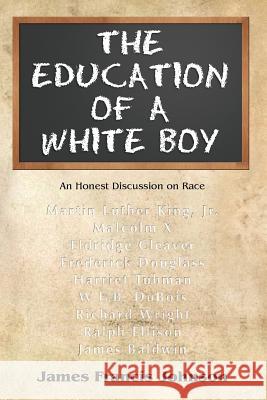The Education of a White Boy: An Honest Discussion on Race » książka
The Education of a White Boy: An Honest Discussion on Race
ISBN-13: 9781477620489 / Angielski / Miękka / 2012 / 302 str.
The story of racism in America is told by two opposing camps. One group is composed of the victims of racial prejudice and those sympathetic to their four-century-long plight, while the other group, usually made up of whites and Fox News pundits, pooh-poohs such talk as mere whining from losers who, at their own peril, refuse to worship at the altar of Free Market Ideology. Liberals will never say a critical thing about African-Americans, while Conservatives will deny that white people have anything to do with maintaining a racist status quo. Now, in one man, James Francis Johnson, the author of The Education of a White Boy, we have someone willing to admit that he possesses all the best and worst traits of both camps. This is the story of how a semi-literate, patriotic white kid from the Philadelphia suburb of Levittown begins life as working class rube, attends a high school infamous for its race riots, and hitchhikes around the country as a destitute drifter operating alongside those left out of the American Dream. Then, at twenty-two, he becomes determined to learn how to read and write like those boys listed on the covers of the Penguin Classics, which leads to the discovery of African-American history and literature, whereupon his worldview suffers a total cataclysm. In high school, he had hated blacks; now he hates whites, and this oscillation continues throughout his quest to be a first-rate literati while still employed as a blue-collar printer at jobs in West Palm Beach, Denver and Boston. He recounts each extreme phase with no apologies or squeamish qualifications. He shows how real people, on the ground, react to racial events in their daily lives, as opposed to how they spin it later on for public consumption. He devotes full chapters to his new heroes, Martin Luther King, W.E.B. DuBois, Ralph Ellison, to say nothing of those who inspired him with their own stories of self-education, Malcolm X, Frederick Douglass, Richard Wright and James Baldwin. He also conveys the importance of George Orwell teaching one to develop the ability to distinguish sloppy writing, which is the product of sloppy thought, from sound composition and thus clear, honest thought. In the end, this is a love-story between the author and the books and essays - the best of the Western Canon, which, in his opinion, should include African-American writers -- that helped transform him from an ignorant, superstitious boy into an articulate, enlightened man. The good news is that anyone can borrow these books from their local library or find them on their Kindle or Nook.
Zawartość książki może nie spełniać oczekiwań – reklamacje nie obejmują treści, która mogła nie być redakcyjnie ani merytorycznie opracowana.











